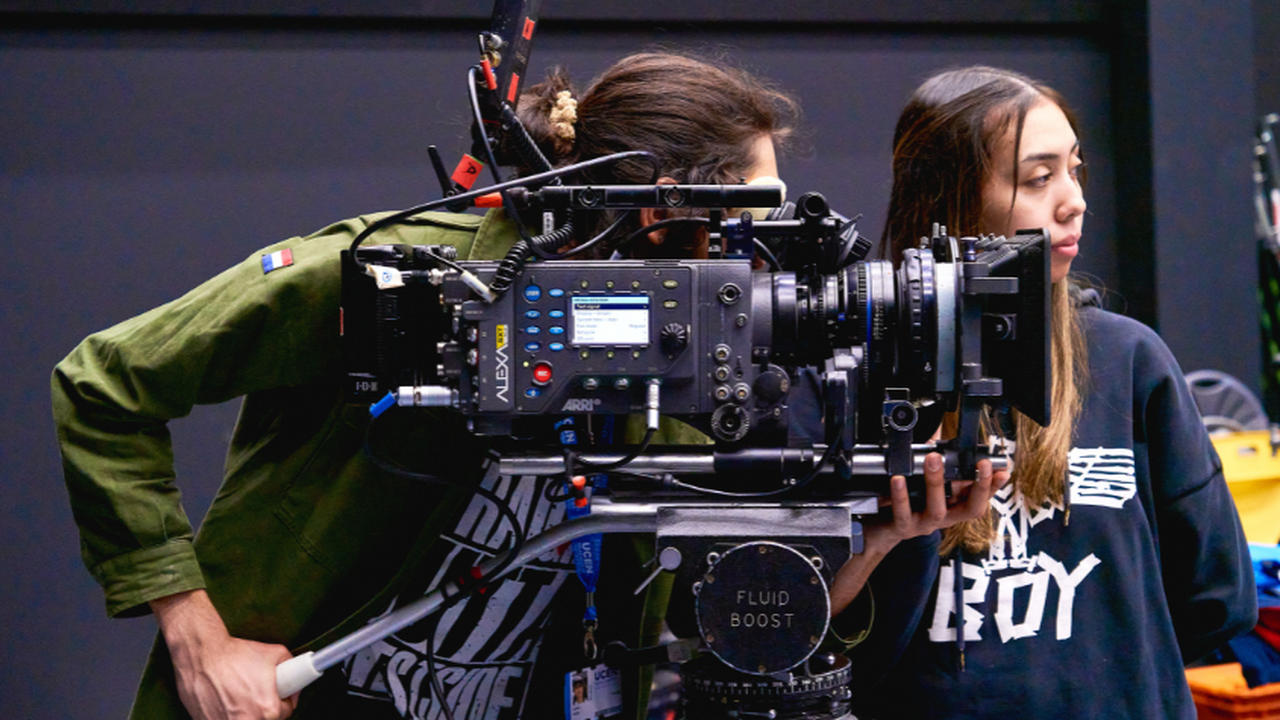How to Become a Film Director

The world of filmmaking is exciting, dynamic and full of opportunity. If you dream of bringing stories to life on the screen, directing movies could be your calling. With around 86,000 jobs in the UK film industry, there's plenty of room for directors to grow and achieve their goals.
This guide will walk you through the essential steps, from building a strong foundation to showcasing your work and launching your career.
We'll cover everything from the director's core responsibilities and necessary skills to the best path to take to get there, such as a film making course. So, if you're ready to take your first step towards calling "Action!", read on.
What does a film director do?
A film director is responsible for every aspect of film production, from pre-production planning to the final cut. Here's a breakdown of some of the key responsibilities:
- Pre-Production: Directors work closely with writers to refine the script, choose the cast and collaborators, scout locations, seek investors and develop a visual style for the film (often with the cinematographer). They create a shooting schedule and budget, basically laying the groundwork for the entire production.
- Production (Filming): This is where the director's leadership is most visible. They guide the actors' performances, deciding how each scene should be played. They collaborate with the cinematographer on camera angles, lighting, and composition. They also work with the crew to ensure everything runs smoothly on set, managing time and resources effectively.
- Post-Production: The director's work continues after filming wraps. They work with the editor to assemble the film, choosing the best takes and pacing the story. They may also collaborate on the soundtrack, special effects and colour correction. The director's vision is crucial in shaping the final version of the film.
In short, a film director is a storyteller, a visual artist, a leader and a collaborator. They're responsible for the overall artistic and dramatic aspects of a film, ensuring that it's a compelling and cohesive work of art. They're the ultimate creative authority on set, bringing a story to life on the screen.
What skills and traits do you need to be a film director?
Film directors need almost all of the following traits to be successful in their role:
- Strong visual storytelling skills
- Ability to translate scripts into compelling scenes
- Excellent communication and leadership
- Adept problem-solving skills
- Collaborative spirit
- Deep understanding of filmmaking (pre- to post-production)
- Passion and vision
- Adaptability
- Innate gift for storytelling and visual composition
- Deep understanding of the human experience
Think of the last time you watched a movie that made you FEEL something. A good director can take a story and execute in a way that helps audiences live the experience of the protagonist through the screen.
How do you become a film director?
Step 1: Watch movies and learn
A strong foundation in film history is essential for aspiring directors. Studying influential films from a range of directors in various genres provides an insight into effective storytelling techniques and the elements that make a film resonate. This deep dive into cinema expands your understanding of the craft and fuels your passion for filmmaking.
Step 2: Attend film school
When you take a film school course, you get a structured environment to hone your filmmaking skills. You'll learn the technical aspects of the craft, from camera operation and lighting to sound design and editing.
Beyond the technical, film school emphasises visual storytelling, teaching you how to translate a script into compelling images and craft narratives that resonate with audiences. It's also a collaborative space where you'll work with other aspiring filmmakers, learning from their perspectives and building valuable connections.
Hands-on experience is a core component, with opportunities to create your own films and work on projects with your peers. This practical experience, combined with classroom learning, provides a solid foundation in all aspects of filmmaking.
As we will go on to discuss, networking is essential if you want to be a director and film school offers an opportunity to start to build a network. You'll connect with fellow students, professors and industry professionals, creating relationships that can be invaluable throughout your career.
Step 3: Crew on film or TV sets
One of the most essential steps to becoming a director is gaining hands-on experience on real film or TV sets. Crewing, even in entry-level positions, provides a firsthand look at the dynamics of a working production, allowing you to observe professionals in action and understand the collaborative nature of filmmaking.
This experience not only builds your practical skills but also strengthens your CV, demonstrating your commitment and experience to potential employers.
A good course in film production like the ones at UCENM can help you secure these opportunities, often offering connections to local productions, internships, or even incorporating crew experience into the curriculum itself.
Step 4: Network in the industry
Building connections with fellow filmmakers, writers, producers, cinematographers, editors, and other industry professionals can open doors to collaborations, first job opportunities and mentorship.
Attending film festivals, workshops and industry events is a great way to meet people. Your film school itself offers a built-in network. You'll connect with classmates who share your passion, professors with experience, and industry professionals.
Step 5: Direct a short film
As a director, your portfolio is your calling card - it's what showcases your skills, style, and vision to potential employers, producers, and collaborators. The best way to build this portfolio and showcase your passion and personal style is by directing.
Creating short films, whether as a personal project or as part of your coursework, is crucial. Shorts allow you to experiment, develop your craft, and demonstrate your ability to tell a compelling story visually. They serve as tangible proof of your abilities and are essential for securing future opportunities.
Step 6: Create a director's reel (portfolio)
A director's reel is a short, dynamic compilation of your best work, essentially a visual resume showcasing your directing skills and style. It's a crucial tool for getting noticed in the industry.
Your reel should include the most compelling scenes from your short films or other projects, highlighting your ability to tell stories visually, work with actors, and create a cohesive and engaging film.
Keep it concise and impactful, focusing on quality over quantity. A well-crafted reel demonstrates your strengths and gives potential employers or collaborators a clear understanding of your capabilities as a director.
Step 7: Submit to film festivals
Festivals offer a platform to showcase your work to a wider audience, including industry professionals, critics, and fellow filmmakers. Acceptance into a reputable festival can significantly boost your credibility and open doors to networking opportunities, potential collaborations and even distribution deals.
Beyond the recognition, festivals provide a chance to see your film on the big screen and experience audience reactions, offering invaluable insights for future projects. While the submission process can be competitive, it's a crucial step for any aspiring director looking to make their mark in the world of film.
Which is the best film and editing course to study?
When choosing a film making course to study, make sure the course has included the following key aspects:
- It covers everything: from writing and filming to editing and sound
- Hands-on learning: it has lots of chances to make films
- Good equipment: it provides you with professional tools to use
- Experienced teachers: you get to learn from teachers who are experienced filmmakers themselves
- Connections: it has opportunities for you to meet and network with industry professionals
- Helps build your portfolio: it gives you the opportunity to build a portfolio so you can show off your work.
- Career help: there is career guidance available so you can start your career as soon as possible once you have completed your course
- Good location: it offers access to resources and a community of filmmakers.
How do I get a film degree?
You can get a film degree by enrolling on a BA hons Film Production course.
Which is the best film school to attend in Manchester?
We might be bias but we passionately believe that the best film school to study at is The Manchester Film School. This is because the film school stands out for its commitment to hands-on learning from day one and students benefit from industry-standard, state-of-the-art facilities at City Campus Manchester.
The programmes it offers emphasise collaborative projects, giving you practical experience working with fellow students on productions like short films. High-end industry placements and the opportunity to contribute to up to six major projects each year provide invaluable real-world experience, preparing you for a successful career in filmmaking.
Discover student insights into why you should study film at The Manchester Film School at UCENM.
Study at The Manchester College film school
Ready to launch your filmmaking career? The Manchester Film School offers hands-on training, industry-standard facilities, and real-world experience. Explore our courses and apply today!

